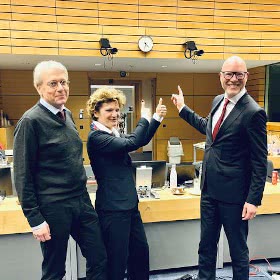
At half past five this morning the negotiators of the Parliament and the Council of the European Union have reached a Preliminary agreement on marine fuels for the benefit of the decarbonisation of maritime transport, whereby greenhouse gas emissions from ships of more than 5,000 gross tonnage tons will have to be reduced by 2% from 2025, by 6% from 2030, 14.5% from 2035, 31% from 2040, 62% from 2045 and 80% from 2050.
 The agreement, as an incentive, grants more credits under Form of offsetting of emissions to shipowners that from 2025 to 2035 will use renewable fuels of non-biological origin (RFNBO) and sets the target of 2% as the share of use of renewable fuels from 2034 if the Commission European will report that in 2031 the RFNBOs amount to less 1% in the fuel mix used to power ships.
The agreement, as an incentive, grants more credits under Form of offsetting of emissions to shipowners that from 2025 to 2035 will use renewable fuels of non-biological origin (RFNBO) and sets the target of 2% as the share of use of renewable fuels from 2034 if the Commission European will report that in 2031 the RFNBOs amount to less 1% in the fuel mix used to power ships.
According to the preliminary agreement, starting from 2030 when ships container carriers and passenger ones will be moored in the major EU ports to use electricity of the ground network for all their energy needs from consume on board, an obligation that from 2035 will extend to all European ports that will have facilities on the quays of cold ironing to supply electricity to ships. The agreement provides that certain exemptions may apply for ships who stop in a port for less than two hours and who use their own Zero-emission technologies or make a port call due to of unforeseen circumstances or emergencies.
Finally, the agreement provides for the European Commission to review the rules on the decarbonisation of shipping by 2028 for decide whether to extend the emission reduction provisions also to ships of lower tonnage or increase the share of energy used by ships from third countries.
"This agreement - exulted the rapporteur Jörgen Warborn, enthusiastic, despite the antelucan hour, for the reaching agreement - defines the most ambitious in the world for the decarbonization of the maritime sector. No other world power has developed such a framework. complete to deal with shipping emissions. This is A real revolution. This regulation will force the others to act. Europe will play its part, but the citizens and European companies won't have to foot the bill for efforts Done for climate around the world."
"We ensure - continued Warborn - industry rules and long-term predictability in order to facilitate Investments. Shipping companies and ports can dedicate their resources to achieve the best results in the fight against climate change and finding the best value for money and results. In this way we safeguard the jobs of the seafarers, port workers and the export sector, and let us set an example to other countries."
The preliminary agreement will now have to be ratified by the Committee of Permanent Representatives of the Council of the EU and the Committee on Transport and Tourism of the European Parliament, and then be adopted by vote of Parliament and the Council.
Congratulating the negotiators on the work carried out on reach agreement, the Secretary General of the Association of European shipowners ECSA, Sotiris Raptis, said he was anxious to know the final text.